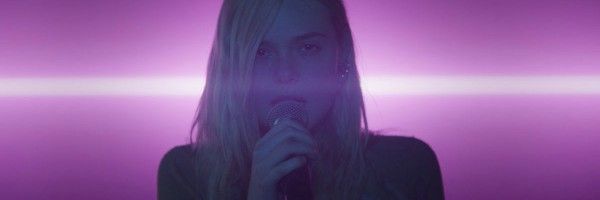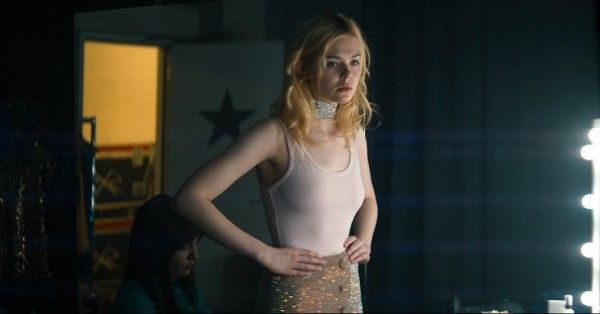[This is a repost of our review from the 2018 Toronto International Film Festival. Teen Spirit opens today in limited release.]
Max Minghella's directorial debut Teen Spirit totally won me over. It's one of those movies I hadn't planned to see in Toronto. One of those movies you see because it fits your schedule, and you just hope for the best. In this case, I was pleasantly surprised by this scrappy tale of a shy teen who sets out to realize her dream of becoming a pop star with help from a very unlikely source. It's a conventional underdog story as far as it goes, but it's handled quite well by Minghella and his leading lady, Elle Fanning.
Fanning plays Violet, a shy but ambitious waitress at a local pub on the Isle of Wight (located off the coast of England), where she lives with her single, Polish mother (Agnieszka Grochowska), her father having disappeared many years ago. She sings in the church choir and dreams of escaping the small, rundown town and becoming a pop star, so it's lucky for her that the pub has some kind of Open Mic/Karaoke night. That allows Violet to take the dingy stage and sing to the drunk patrons, none of whom seem to appreciate her raw talent. That is, until the night that Vlad (Zlatko Buric) hears her sing and as a former opera singer himself, is impressed with her voice. Vlad is a bit washed-up and may be a drunk, but his ear is still sound, and with it, he hears potential.
Decidedly unimpressed with the wild-haired, world-weary old man, she doesn't think much of the interaction until it comes time for her audition for Teen Spirit, a British singing competition that requires the permission of an adult guardian. In a bind, Violet turns to Vlad and he agrees to become her chaperone/manager/unlikely mentor -- for a staggering 50 percent! If you know anything about showbiz, you'd know that isn't a great deal for Violet, but at least it changes in time once the girl's mother finds out about their unusual arrangement. Vlad doesn't put up too much of a fight, as you come to discover that it's not really about money for him, but rather, a second chance to do things right. He may have squandered his potential and become content to drink his days away at the pub, but he also sees potential in Violet and finds renewed purpose in taking the reins of her career and coaching her technique. And off she goes on a true underdog story that will offer her temptation at every turn. Minghella effectively uses montage to whisk us through the early stages of the competition, but you've seen this story before, so you know it'll all come down to 'the finals' -- though there are some pleasant surprises along the way.
Of course, the following isn't one of them, for assuredly when you enter one of these competitions, the idea is that you're kind of making a deal with the devil. In this case, Violet ends up being offered a recording contract prior to the final competition. If she loses, it doesn't really matter, because she'll still get to make an album. But if she wins, and other record labels come calling with more attractive offers, then she's stuck with the original deal... if she signs it. There's a catch, of course. The proverbial Devil, in this case, the Teen Spirit producers as embodied by a well-cast Rebecca Hall, want Violet to cut Vlad out of the deal. So not only does the competition test her talent, it tests her integrity as well. She wouldn't have made it this far without the crazy old coot, but does she really need him now that she has, to some extent, made it? It's an offer she shouldn't refuse, but whether she does or not is another question entirely.
What's nice about Teen Spirit is that Minghella isn't aiming to indict the music industry or singing competitions here, instead wisely choosing to play it very earnest. This isn't necessarily supposed to be a biting satire of our culture's obsession with fame. We've seen enough cynicism about showbiz, and that's why I liked the bubblegum feel of Teen Spirit. It's better than 2006's American Dreamz, and isn't half as dark as, for example, Vox Lux -- itself hailing from a young actor-turned-director in Brady Corbet. Speaking of which, you might remember Minghella from The Social Network, or perhaps The Handmaid's Tale, or maybe you just recognize his last name as the son of Anthony Minghella, the Oscar-winning director of The English Patient. Minghella has carved out a career for himself as an actor, but his ceiling as a director may be a bit higher, as not only does Teen Spirit work as a first film, but it hints at greater things to come from its up-and-coming filmmaker. I was a bit surprised to learn that Minghella also wrote Teen Spirit and that this was the story he wanted to tell, but I'm glad he told it, even though, again, it doesn't reinvent the wheel. It's not going to change any lives, but it works.
A big reason for that is Buric's performance, which is the polar opposite of the way most talent/music managers are depicted in film and television. Fanning deserves credit for elevating this film and making us really care about Violet, but make no mistake, Buric is the heart and soul of Teen Spirit. Watching him listen to his old opera recording, reliving his glory days while fully knowing that it's Violet's turn to step into the spotlight and make a name for herself, is a minor thing of beauty, as is the emotion in Fanning's face when she finally gives Vlad a climactic hug. If there's a weak link among the cast, it's everyone around Violet, from her makeshift band that accompanies her to London, to the handsome pop star who gets Violet drunk and puts the moves on her, having gone through the same ringer himself.
Fanning has the innocent pop star look down, but her singing really impressed me here, and she supposedly performed all the songs live on her own, without any assist from Auto-Tune. She may not be the next mainstream major star created by the competition, but there's a soul to her performances that suggest a certain longevity as an artists. And speaking of those performances, Minghella does a nice job staging the competition and making each one feel like a music video. He has a strong sense of visuals, and it helps that the film features the recognizable music of Katy Perry, Ariana Grande, Ellie Goulding, Annie Lennox, Tegan & Sara, Major Lazer and many more popular artists, which should up the buzz factor just a bit. Music supervisor Steven Gizicki deserves credit for curating the soundtrack, and the film boasts a score from Marius De Vries, who served as the music director on both Moulin Rouge and La La Land. Indeed, the latter film shares a producer (Fred Berger) in common with Teen Spirit, which also debuts an original song from Jack Antonoff titled "Wildflowers."
Despite the Grammy-winning names and power pop ballads on its soundtrack, it's important to keep in mind that Teen Spirit is a low-budget indie film, and Minghella makes the most of it. The story may be a bit conventional, but at least the director introduces several stylistic flourishes to keep things interesting, and the film never feels cheap. It's a strong sign of things to come from Minghella, and I'm not surprised that the film was acquired for a reported $3 million during the festival. Just as Vlad saw (well, heard) something in Violet, I saw something in this movie, and predict that under the right circumstances, it'll find a bigger audience than Fanning's last few festival films.
Rating: B


